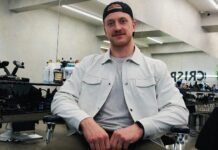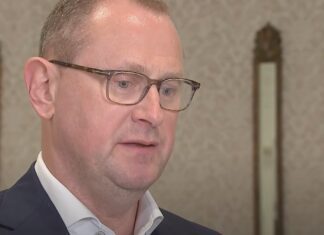Kyle Dubas scrummed with the media after announcing the signing of John Tavares, discussing the team’s cap situation moving forward, the team’s depth down the middle, the organization’s other additions today, and much more.
On the smaller signings today:
Dubas: We wanted to have more of a depth presence with someone who can definitively come up and that’s where [Adam Cracknell] and Josh Jooris come in, and we also signed Jordan Subban. Played against him a lot with Utica and obviously I’m familiar with him from the OHL. We just feel we can help him in the areas of his game that need work. He’s got really, really good top-end shot, skating and offensive potential. We are excited to get him into our development program and get rolling.
People have been calculating how you can fit all of these young players when you have to re-sign some of these young guys under the cap. When you look at the situation, do you feel this signing gives you some flexibility to make some moves down the road if you have to, with all of the plethora of talent up front?
Dubas: Certainly, this year, we still have a healthy amount of cap space. Eventually, our younger players, as they continue to develop and progress, they are going to want to be paid what the market bears for them and that is no problem on our end. We are well situated to handle that when it comes.
I think we will always remain flexible. I think with John today, certainly, it’s very evident he could have gotten more elsewhere. I think that sets a great tone for our organization. He obviously wanted to be here versus going out and getting the most money. That’s obviously not a surprise given what we know about his character. I think that’s a great message for us and to our fan base and our young group as well – that this guy wanted to be here with them and passed up other opportunities to be here with us. I think, already, we’ve had, as the day has gone on, some veteran players who were seeking longer term deals that are saying they’d like to come here on the short term. That is up to us to continue to keep that train rolling. That is really on me, and not anyone else, to continue to manage that. We’ve got a great staff with Brandon Pridham and Laurence Gilman. We will be on it and continue to manage this properly.
You’ve got a scenario here where you’ve got Tavares, Matthews and Kadri down the middle. How important is that going to be when you look at what Washington was able to accomplish with their three centers this year and Pittsburgh with Malkin and Crosby?
Dubas: It’s very, very important for us. That’s what we focused on and went in the direction we did and how hard we did with John. We felt the time was right, but I think what it provides for us is an ability to create matchup problems. Mike is certainly the type of coach you want to exploit those. I think it’s very exciting for our wingers as well. Not only do we have the three centers, we’ve got a healthy allotment of wingers that can play with them and can make plays with skill. It is very exciting for us. Obviously, as you look into trying to build a team that go into the playoffs, we’ve got to get past the first round and we’re in a very tough division still. This doesn’t change that. But we’re trying to get past those two teams that finished ahead of us and stay ahead of the rest. We felt this was a good way for us to go about that as we continue to perfect that process here.
What kind of sense did you get from John as far as his checklist and what he really wanted in his landing spot?
Dubas: It was very, very methodical. He was very well prepared for the process. You go and you talk to a lot of free agents every year. They’re not usually as high profile as this. He was by far the most prepared I’ve ever seen. We came in and he had a very detailed list of questions he wanted answer about our style of play and about how Mike was going to use him, about my vision for the team and how we were going to move ahead and keep the core of the group together – what our strategy was. He was very detailed and direct. That was outstanding because a lot of times you wish you had players that were as invested in that same process as you were. In getting to deal with a lot of the players here on a daily basis, it is a great group of intelligent young guys. It has been a very, very exciting process for me to go through. He was very detailed in his questioning, which impressed me, and we tried to go through all of that with him and explain back to him in a very detailed way back how we would use him and how this all fits and works together.
What did you want to know from him?
Dubas: What I wanted to know from him – and I’m doing this every time I am getting someone to join our staff – is what are his major concerns? Not only on the ice, but off the ice. One of the things I say to all of our players and staff — Brendan alluded to it there – is that it’s not just the staff that go through this. Their family goes through it with them. A lot has been said about how Toronto is a very difficult place to play and the media is very tough. That hasn’t been my experience here at all. I’ve found the media to be very fair. I’ve found the public to be extraordinarily supportive and respectful of our family space. I think when we perform poorly, we hear about it, which is fair. When we are doing well, we get told we are doing well, which is fair. It’s nothing malicious.
Just educating them on that… it’s easy for me because we have a young family. It’s easy for me to speak to what they are going to go through. We moved to Toronto the first summer we got married. They are getting married this summer. We started our family here as I was joining the organization. It’s obviously a very public position, but it is never overwhelming. As strange as it might seem to say, it is nothing like it was in the Soo, where every single person knows you and every single person is all over you all the time, even when you are winning or losing, telling you how bad you are or how you aren’t good enough. We kind of went through all of that and talked about that.
The way that we run our family program, which we’ve developed and evolved – it’s very, very important to us. That’s kind of what our focus was, for sure.
Has the core of this team grown into the expectations placed upon them? Exponentially, they’re going to grow yet again this season.
Dubas: I think the core… It’s sort of interesting. When people say the core of the team, they focus on Auston, William and Mitch. When I look at the core of the team, I think often times Morgan Rielly and Jake Gardiner and Nikita Zaitsev and Freddy Andersen get glossed over a lot. And then you’ve added Patrick Marleau and Ron Hainsey to it as well, in addition to Zach Hyman and Connor Brown. I think the core of our team is very, very solid. They’ve developed very well. Mike has done an excellent job in continuing to have that development carry on since they’ve been with the Leafs. I think it’s only going to continue to improve. I’ve got a lot of faith in our development program and coaching staff that our guys are going to continue to get better every day. That is the exciting part, for sure.
Each step along the way, is there a sense of pride that your stamp is on this team now?
Dubas: I’ve been here now for four years and I’m excited to just be a part of the process. I’m very fortunate to work with the people I work with, obviously, with Brendan and our staff. It’s a great group of people to be a part of. I don’t need to feel like that at all. I’m just a part of the group and I do what I can to add to it and guide it wherever I can. That’s really it.
When you walked out of the meeting on Monday, what were you thinking and feeling? For the rest of the week, what was the rest of the week like as you waited for some kind of closure?
Dubas: I felt the same way as when I walked out of their office as when I interviewed in Sault Ste. Marie. It was the only two meetings where I had no idea how they had gone. I had no feeling one way or the other. Sometimes you go into a meeting and you know it’s gone badly, and other times you walk out and think, “Oh, we did great.” This one was just like that – I had no idea whether we did great or poorly. Throughout the week, you start to hear anecdotes out of their camp, and then you go up and down. It’s an emotional decision for him, so that goes up and down and that gets cast back onto us and the other teams that are involved. You just kind of ride the wave during the week and try to ride it well and continue to focus on what our other plans would’ve been. We’re happy it came to the conclusion that it did.
































